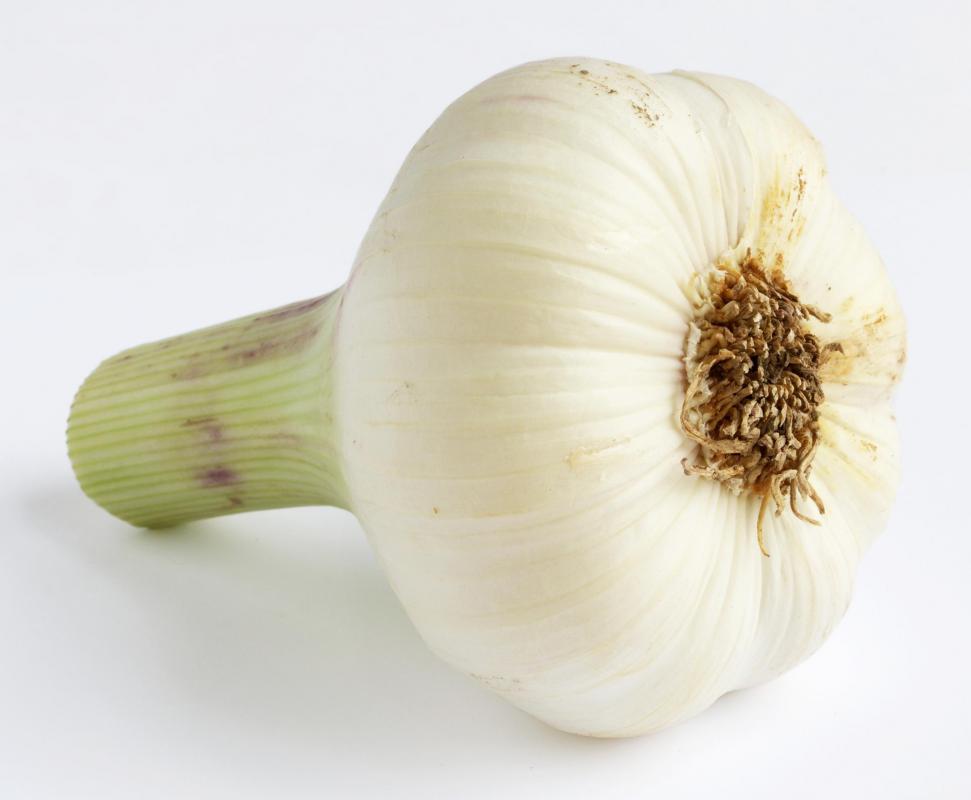At AllThingsNature, we're committed to delivering accurate, trustworthy information. Our expert-authored content is rigorously fact-checked and sourced from credible authorities. Discover how we uphold the highest standards in providing you with reliable knowledge.
How Effective Is Garlic for Fleas?
There are very few studies which show the exact level of effectiveness in using garlic for fleas, but many pet owners and holistic practitioners advise its use as a form of repellent. It is often not as responsive as chemical based treatments, and it generally work best when used in combination with other remedies. The use of garlic for fleas is also not advised without the counsel of a veterinarian or in dogs who have severe infestations.
Garlic can prevent fleas because it alters the way the dog or cat’s blood tastes. Fleas are repelled by garlic’s flavor and smell, and tend to naturally avoid it. The effectiveness of using garlic for fleas will partially depend on the source of the garlic. Tablets or supplements are usually less effective overall than fresh garlic, although they may be gentler on the stomach. Commercial garlic tablets are sold specifically for this purpose.
Garlic is most effective for prevention rather than treatment of fleas. Dogs who have few or no fleas may need no additional treatment once a garlic regimen is started. Severe cases may require chemically-based treatments.

Fresh garlic may yield better results when using it for pest prevention. To do this, finely chop one clove of fresh garlic and add it to the pet’s water or food. It is not advised that pets be given garlic every day, as it may cause stomach pain and digestive upset. Larger dogs, meaning 60 pounds(27.21 kg) or more, may require two cloves. Garlic oil may also be used, but medical advise should be sought to get proper dosage instructions.

Using additional methods of flea prevention generally increases the overall effectiveness of using garlic for fleas. For natural methods, this can include frequent baths and use of a flea comb several times per week. There are also flea collars, shampoos, and powders which can be used if going all-natural is not the goal.
When using garlic for fleas, it is important to be watchful for any troubling symptoms which may occur. Although safe for most animals, the use of fresh garlic may cause digestive upset in some. If this does occur, pet owners should discontinue use and consult a veterinarian if vomiting or diarrhea occur or become severe.
Frequently Asked Questions
Can garlic be used to repel fleas on pets?

While some anecdotal evidence suggests that garlic may help repel fleas, it is not widely recommended by veterinarians due to potential toxicity. Garlic can cause hemolytic anemia in dogs and cats, even in small doses. Safer, vet-approved flea treatments should be considered as the primary option for flea control.
How does garlic supposedly work against fleas?

Garlic is believed to work against fleas by creating an odor or taste in the pet's skin that is unappealing to fleas. This is due to compounds like allicin in garlic. However, this method is not scientifically proven, and the risks of garlic toxicity in pets make it an unsuitable flea repellent.
What are the risks of using garlic for flea treatment in pets?
Garlic can cause gastrointestinal upset and damage red blood cells leading to hemolytic anemia in pets. Symptoms of garlic toxicity include vomiting, diarrhea, lethargy, abdominal pain, and pale gums. The use of garlic for flea treatment is risky and should be avoided to ensure the health and safety of pets.
Are there any studies that support the use of garlic for fleas?
Scientific research on the efficacy of garlic for flea control is limited and inconclusive. While some natural remedy proponents claim garlic can repel fleas, these claims lack robust scientific backing. Experts and organizations like the ASPCA list garlic as toxic to pets, advising against its use for flea control.
What are alternative, safe flea treatments for pets?
There are numerous safe and effective flea treatments available for pets, including topical solutions, oral medications, flea collars, and shampoos. These products are specifically designed to control fleas without harming pets and are approved by veterinarians. Always consult with a vet before choosing a flea treatment for your pet.
Can garlic be used in the environment to control fleas?
Using garlic in the environment as a flea repellent is not supported by scientific evidence and is unlikely to be effective. Instead, environmental control should focus on vacuuming, washing pet bedding, and possibly treating the home and yard with vet-approved insecticides or natural alternatives like diatomaceous earth, which is safe and has been shown to be effective against fleas.
AS FEATURED ON:
AS FEATURED ON:














Discuss this Article
Post your comments